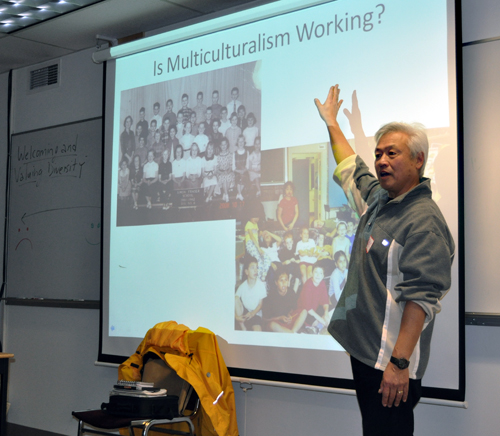
By David F. Rooney
Issues arising from Canada’s national diversity and multiculturalism policies are not as cut and dried as many people may imagine. In fact, as attendees at an Okanagan College workshop on diversity discovered Wednesday evening, they can be complex and problematic.
“Multiculturalism is really about welcoming and accommodating differences,” diversity expert Eric Wong told the group. “The question is, ‘How far do we go to welcome and accommodate those differences?'”
Wong visited local schools, talking with students and teachers about diversity. He visited the city through the provincial Welcoming and Inclusive Communities and Workplaces Program which is administered in Revelstoke by Okanagan College.
Through a series of group exercises, the adult workshop participants at the college discovered that it’s one thing to accommodate certain cultural activities like, say, the tradition of some Italian families of getting together to make tomato sauce. That’s a harmless, even beneficial family-based activity that virtually no one would object to. But what about the practice of arranged marriages? Or polygamy? Are those practices ones that most Canadians will welcome and accommodate even though their practitioners may claim they have a right to it under Canada’s Charter of Rights and Freedoms guaranteeing freedom of religion?
Canada has always been a nation of immigrants but 50 or 60 years ago when today’s Baby Boomers were growing up most people here were white and followed a range of Christian faiths.
Wong, whose family has been in BC since the late 19th century, noted that when he was growing all but four of the kids in his elementary school class were Caucasians and all but one of them had been born in Canada. He contrasts that with his daughter’s class. About 40 per cent of the kids in her class were born elsewhere and speak English as a second language.
The multicultural, multi-racial nature of the country is not always apparent in small cities like Revelstoke, but travel to the big cities where most Canadians now live — places like Vancouver, Calgary, Edmonton, Toronto, Ottawa and Montreal — and the changed appearance of our national demography is clear.
Canadians have been discussing the value of multiculturalism and diversity ever since the policies were first introduced under former prime minister Pierre Trudeau and the dialogue shows no signs of ending any time soon, even here in Revelstoke.
The college has been actively promoting discussion in the community about the value of diversity and multiculturalism and a multiculturalism society has been formed to work on an action plan to promote diversity and combat racism. It is also planning another Carousel of Nations event that will be staged during February’s Spirit Festival.
“I’ll lay this prediction on the table,” Wong said. “This conversation will be continuing throughout my children’s lifetimes, too.”
To find out more about WICWP and the local multiculturalism discussion please contact BR Whalen at Okanagan College, 250-4235, ext. 6505.



